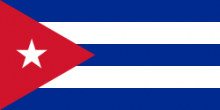
Cuba existed as a Spanish colony since its discover in 1492 until the Spanish American War in 1898. Spanish rule ended when Cuban civilians prompted an independence movement that, despite the Spaniard’s harsh attempts to dismiss the rebellions, was ultimately successful with the assistance of the US. Following the overthrow of Spanish rule, Cuba amended their constitution with the Platt Amendenment, providing the US authorization to participate in Cuban politics at times of insatiability. Cuba freed itself from US involvement with the Treaty of Paris in 1902, and later in 1959, Fidel Castro came to power through a rebellion and withheld his regime for five decades. Castro was known for his iron rule, and only stepped down to let his younger brother take the reigns. Castro’s rule was dominated by Communist practices, brute force, and multiple civilian rebellions. After the Soviet collapse, Cuba took a hit economically, but continues as one of the remaining socialist states with a Communist government. The US currently has an embargo in place as a way to incentivize a shift towards democracy and a respect for human rights in the region.
